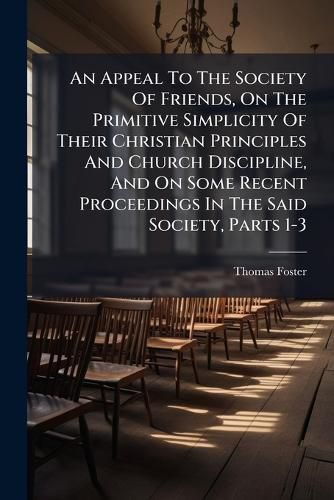Readings Newsletter
Become a Readings Member to make your shopping experience even easier.
Sign in or sign up for free!
You’re not far away from qualifying for FREE standard shipping within Australia
You’ve qualified for FREE standard shipping within Australia
The cart is loading…






This is a timeless appeal by Thomas Foster to the Society of Friends, urging a return to the "Primitive Simplicity" of their foundational Christian principles and established church discipline. In three parts, Foster addresses pressing issues and "Recent Proceedings" within the Society, advocating for adherence to core tenets and practices.
Foster's writing provides valuable insights into the historical and spiritual landscape of the Quaker movement, offering a critical examination of its evolving identity. This work will be of interest to those studying Quaker history, theology, and the challenges faced by religious communities seeking to maintain their original vision. Its enduring relevance lies in its call for faithfulness to foundational values amidst changing times.
This work has been selected by scholars as being culturally important, and is part of the knowledge base of civilization as we know it. This work was reproduced from the original artifact, and remains as true to the original work as possible. Therefore, you will see the original copyright references, library stamps (as most of these works have been housed in our most important libraries around the world), and other notations in the work.
This work is in the public domain in the United States of America, and possibly other nations. Within the United States, you may freely copy and distribute this work, as no entity (individual or corporate) has a copyright on the body of the work.
As a reproduction of a historical artifact, this work may contain missing or blurred pages, poor pictures, errant marks, etc. Scholars believe, and we concur, that this work is important enough to be preserved, reproduced, and made generally available to the public. We appreciate your support of the preservation process, and thank you for being an important part of keeping this knowledge alive and relevant.
$9.00 standard shipping within Australia
FREE standard shipping within Australia for orders over $100.00
Express & International shipping calculated at checkout
This is a timeless appeal by Thomas Foster to the Society of Friends, urging a return to the "Primitive Simplicity" of their foundational Christian principles and established church discipline. In three parts, Foster addresses pressing issues and "Recent Proceedings" within the Society, advocating for adherence to core tenets and practices.
Foster's writing provides valuable insights into the historical and spiritual landscape of the Quaker movement, offering a critical examination of its evolving identity. This work will be of interest to those studying Quaker history, theology, and the challenges faced by religious communities seeking to maintain their original vision. Its enduring relevance lies in its call for faithfulness to foundational values amidst changing times.
This work has been selected by scholars as being culturally important, and is part of the knowledge base of civilization as we know it. This work was reproduced from the original artifact, and remains as true to the original work as possible. Therefore, you will see the original copyright references, library stamps (as most of these works have been housed in our most important libraries around the world), and other notations in the work.
This work is in the public domain in the United States of America, and possibly other nations. Within the United States, you may freely copy and distribute this work, as no entity (individual or corporate) has a copyright on the body of the work.
As a reproduction of a historical artifact, this work may contain missing or blurred pages, poor pictures, errant marks, etc. Scholars believe, and we concur, that this work is important enough to be preserved, reproduced, and made generally available to the public. We appreciate your support of the preservation process, and thank you for being an important part of keeping this knowledge alive and relevant.